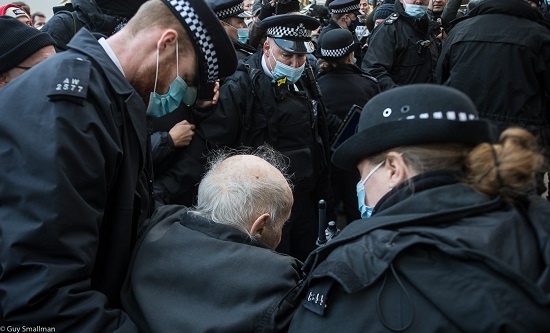
Main article image: Police forcibly dispersed Assange’s supporters, including 92-year-old Eric Levy, who were protesting outside the bail hearing on 6 January. (Photo: Guy Smallman)
In a surprise ruling, a British court has decided that Julian Assange must not be extradited to the US, where he would face 18 charges of espionage, relating to the publication of numerous classified documents that uncovered the war crimes perpetrated by the US and its allies in Iraq and Afghanistan. If the extradition had gone ahead, Assange would have faced a sentence of up to 175 years’ imprisonment, with the added prospect of spending it in solitary confinement at one of the US’s notorious Supermax prisons.
Following a lengthy hearing, which began in February 2020 and concluded in September, District Judge Vanessa Baraitser ruled on 4 January 2021 that the conditions under which Assange would be detained in the US would be ‘oppressive by reason of mental harm’ and would not prevent him from taking his own life. By concentrating on Assange’s deteriorating mental health, Baraitser was able to determine against his extradition whilst rejecting all the political arguments made by Assange’s defence team, accepting all the Trump administration’s legal arguments for extradition and disregarding the exemptions for political prisoners in the 2007 Extradition Treaty between Britain and the US.
This ground-breaking ruling is a victory for Julian Assange and his many supporters in countries across the world and the campaign they have waged. However, the fight to defend journalistic freedom is far from over, and the case has shown up the liberal press as complicit in censoring and attacking those who speak out against imperialism. Whilst many major newspapers had previously used documents posted on WikiLeaks, and The Guardian, in particular, enhanced its reputation as a whistle-blowing publication, when Assange was in the dock, they did not defend him. Instead, they distanced themselves from him and resorted to petty attacks against his character. Through a combination of downplaying the political nature of this case and outright silence, the mainstream media have taken the side of the oppressor and demonstrated that even when standard journalistic practices are put on trial, they will always concede to imperialism.
Julian Assange remains in custody at HMP Belmarsh, having been refused bail on 6 January. Assange’s supporters, who attended the bail hearing, as they have every one of his court appearances, were forcibly dispersed by the police.
The outgoing Trump administration intends to file an appeal against Judge Baraitser’s ruling that Assange should not be extradited. As yet, it is unclear as to what extent President-elect Joe Biden will continue to pursue these charges, but Biden’s track record indicates he is no ally of whistle-blowers and will come down heavily on anyone who challenges US imperialism; he has referred to Julian Assange ‘a hi-tech terrorist’.
In the short term, we must demand that Assange is released from custody so he can receive the medical treatment he needs. While the US legal and prison system has been denied the chance to effectively kill Assange, we need to ensure that the British system is not given the same chance. Assange’s case demonstrates how imperialist powers collude with one another and the lengths to which they will go to make an example of those that expose them. But it also highlights the power of organising to fight for justice.
No extradition to the US! Free Assange now!
SEAMUS O’ TUAIRISC




